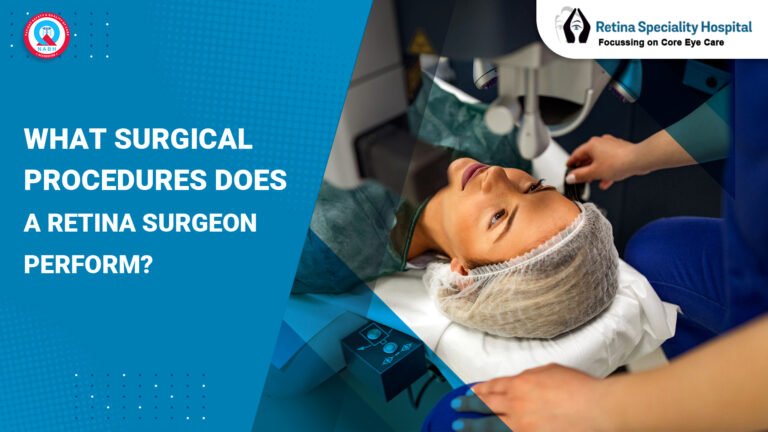Winter brings with it cool breezes, cozy mornings, and a slight chill in the air. But did you know it also brings risks for your eyes? Many people experience dryness, irritation, and vision changes during the colder months. If left unchecked, these issues can progress into serious retinal problems, sometimes requiring a surgery called vitrectomy. The good news? With the right winter eye care tips, you can lower your risk and safeguard your eyesight. If you’re searching for the best eye hospital in Indore, or the best hospital for vitrectomy in Indore, Retina Speciality Hospital is here to guide you with expert advice.
Why Winter Eye Care Matters for Vitrectomy Prevention
Cold weather often leads to dry indoor air, reduced humidity, and increased eye strain. These factors can worsen retinal conditions such as:
- Diabetic retinopathy
- Macular holes
- Retinal detachment
- Vitreous hemorrhage
If untreated, these can eventually require a vitrectomy surgery—a procedure where the vitreous gel inside your eye is removed to restore vision.
Prevention is always better than cure. Winter-specific eye care not only protects your comfort but also helps in Vitrectomy Prevention.
Stay Hydrated to Support Retinal Health
Dehydration is more common in winter than we realize. Cold weather often reduces thirst, leading to lower water intake. But your eyes need adequate hydration to maintain tear production and retinal health.
Tips for Winter Hydration:
- Drink at least 2–3 liters of water daily.
- Include hydrating foods like oranges, cucumbers, and leafy greens.
- Avoid excess caffeine and alcohol, as they can worsen dryness.
Protect Eyes from Dry Indoor Air
Indoor heating during winter reduces humidity, causing dry eyes and increasing retinal strain. Chronic dryness can worsen retinal issues over time.
Actionable Solutions:
- Use a humidifier in your living room and bedroom.
- Follow the 20-20-20 rule (every 20 minutes, look at something 20 feet away for 20 seconds).
- Wear protective glasses to reduce moisture loss when outdoors.
Eat a Retina-Friendly Winter Diet
Nutrition plays a vital role in maintaining eye health, especially during cold weather when immunity often drops.
Winter Superfoods for Eye Care:
- Carrots & Sweet Potatoes: Rich in Vitamin A for strong retinal cells.
- Citrus Fruits: Provide Vitamin C, which supports blood vessels in the retina.
- Fish (Salmon, Tuna): High in Omega-3 fatty acids, essential for preventing retinal damage.
- Nuts & Seeds: Contain Vitamin E and zinc to delay age-related retinal issues.
A healthy diet is your first line of defense in Vitrectomy Prevention.
Shield Your Eyes Outdoors in Winter
Winter sun can be deceiving—UV rays are still strong and can harm your eyes. Cold winds may also trigger irritation and retinal stress.
Quick Protection Tips:
- Wear UV-protected sunglasses when outdoors.
- Use wraparound glasses to protect from dust and wind.
- Avoid looking directly at bright reflections from snow or vehicles.
This small habit is powerful in keeping your retina safe, ensuring Vitrectomy Prevention during harsh winters.
Manage Chronic Conditions Effectively
Winter can worsen underlying health issues like diabetes and hypertension, both of which directly impact retinal health. Patients with uncontrolled diabetes are more likely to develop diabetic retinopathy, a leading cause of vitrectomy surgery.
What You Can Do:
- Monitor blood sugar and blood pressure regularly.
- Stick to prescribed medications and healthy routines.
- Schedule routine eye checkups at the best hospital for vitrectomy in Indore—Retina Speciality Hospital.
Early management is the key to Vitrectomy Prevention in high-risk patients.
Importance of Regular Eye Checkups in Winter
Even if you don’t notice major symptoms, winter is the right time for a preventive eye exam. Early detection of retinal issues can help avoid the need for complex procedures.
Benefits of Regular Eye Exams:
- Detect retinal tears, holes, or early signs of detachment.
- Monitor changes in diabetic and age-related retinal conditions.
- Personalized guidance for Vitrectomy Prevention.
At Retina Speciality Hospital, widely known as Indore’s best eye hospital, expert retina specialists use advanced diagnostic tools to ensure you get accurate results and the best care.
FAQ on Winter Eye Care and Vitrectomy Prevention
Q1: What is vitrectomy, and when is it needed?
Vitrectomy is a surgery where the vitreous gel inside the eye is removed to treat conditions like retinal detachment, macular holes, and severe diabetic retinopathy. It’s usually needed when retinal problems threaten vision.
Q2: Can lifestyle changes really prevent vitrectomy?
Yes, healthy habits like proper diet, hydration, UV protection, and managing diabetes can lower risks of retinal damage, delaying or preventing the need for surgery.
Q3: How often should I visit an eye doctor in winter?
For healthy individuals, once a year is sufficient. For those with diabetes, hypertension, or existing retinal problems, checkups every 3–6 months are recommended at trusted centers like Retina Speciality Hospital Indore.
Q4: Is winter really riskier for eyes?
Yes, because dry air, reduced immunity, and lifestyle changes in winter can worsen eye dryness, strain, and chronic conditions—all of which affect retinal health.
Conclusion
Winter can be beautiful, but it also poses hidden risks for your eye health. By staying hydrated, eating a retina-friendly diet, protecting your eyes from dryness and UV rays, and managing chronic health conditions, you can take powerful steps toward Vitrectomy Prevention. If you’re looking for the best hospital for vitrectomy in Indore or simply need trusted eye care this winter, visit Retina Speciality Hospital—recognized as the Indore best eye hospital for advanced retina care.












